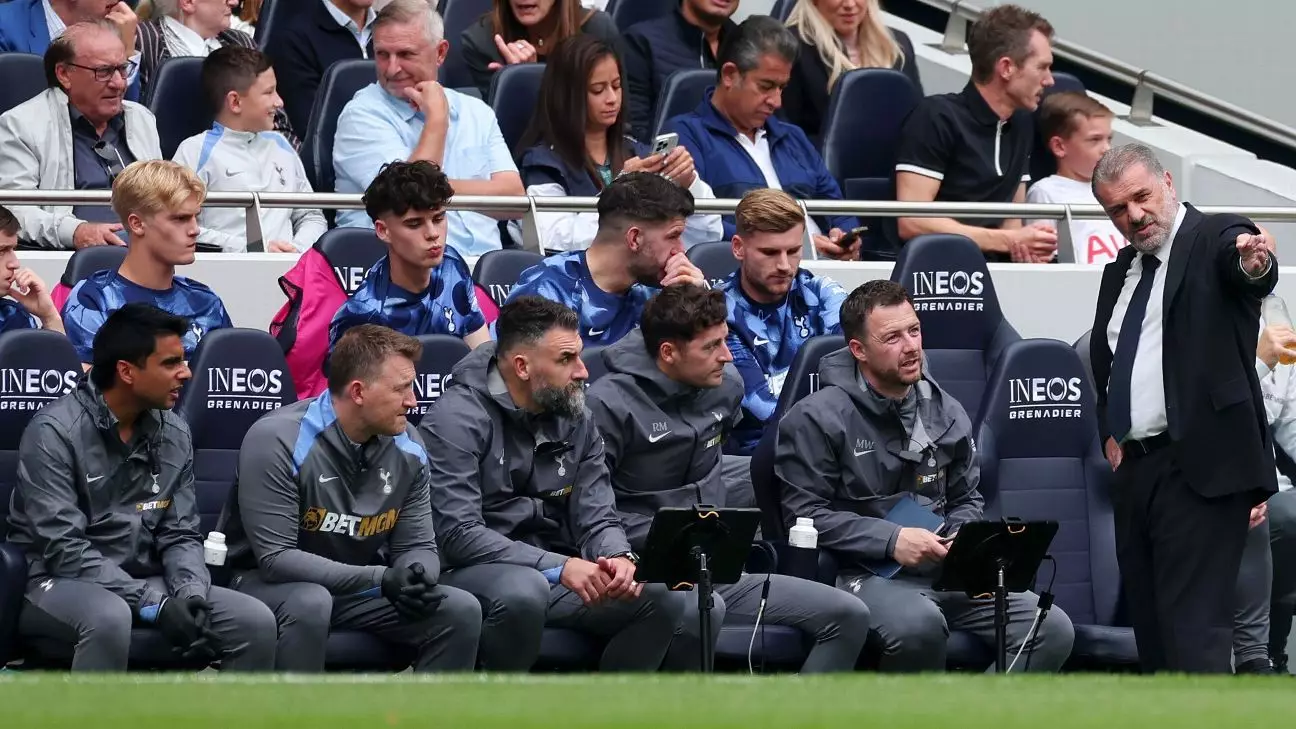The life of a professional football coach entails a whirlwind of activities, decision-making, and strategic planning that often remains hidden from the public eye. A closer look at Tottenham Hotspur’s training grounds reveals the intensity and dedication that characterize the environment in which assistant managers like Mile Jedinak and Nick Montgomery operate. The industry’s demanding nature, coupled with the expectations placed upon coaches, drives these individuals to work tirelessly in pursuit of both team success and personal improvement.
After a disappointing loss to Galatasaray in the UEFA Europa League, the Tottenham coaching staff faced an uphill battle. The team returned home on a flight that landed at 3:30 a.m., whereupon the coaches had to quickly shift their focus to the upcoming fixture against Ipswich Town. Recovery from such a loss is not merely about physical recuperation; it involves reevaluating tactics, addressing lapses in performance, and planning how to convey this information to the players.
In the early hours at Hotspur Way, the coaching staff utilized the training facilities’ sleeping accommodations to grab short but crucial moments of rest before diving into the day’s activities. These hours may have been brief, but they were essential in preparing not only for the next match but also in fostering a culture of continuous development within the squad.
Jedinak elucidated this process when he emphasized the interconnectedness of their tasks. Each meeting, each analysis session, and every training session builds upon the last, forming an intricate web of information and performance feedback. For coaches, the capacity to adapt to such dynamics is what solidifies their roles as effective leaders.
The role of a coaching assistant is not to be underestimated. Assistant coaches like Jedinak and Montgomery play pivotal roles in shaping player development while facilitating the distribution of tactical knowledge. Their responsibilities extend beyond the pitch into team meetings and individual sessions, where conveying a unified message becomes paramount.
The coaching staff operates in a collaborative environment where mutual respect and personal accountability are essential. Postecoglou’s management style fosters a sense of loyalty among players while maintaining necessary boundaries to make tough decisions when needed. This delicate balance is critical; it helps prevent emotional sentiments from clouding judgment in competitive situations.
Both coaches acknowledge that their interactions with players are not limited to physical training. Team meetings, one-on-one discussions, and unit strategy sessions are vital for ensuring that players understand their roles and responsibilities. This holistic approach to coaching enables the staff to build stronger connections with players, ultimately enhancing performance on the field.
A defining characteristic of Postecoglou’s coaching philosophy is the trust he places in his assistants. Montgomery highlights the empowerment that comes from being entrusted with significant responsibilities. When a manager delegates authority and demonstrates confidence in his staff, it fosters a work environment where coaches feel motivated to innovate and collaborate effectively.
Montgomery’s journey through football has been marked by his commitment to nurturing young talent, a philosophy he shares with Postecoglou. His experiences at various clubs have instilled in him a profound appreciation for the importance of player development. This synergy between manager and assistant enhances Tottenham’s prospect of unearthing and cultivating fresh talent capable of contributing significantly to the team’s success.
Despite the stark differences in resources between the Premier League and other leagues, the essence of football remains unchanged—the pursuit of victory and improvement. That sentiment is palpable in Montgomery’s enthusiasm for the team’s attacking style and eagerness to exploit the potential of young players.
As the season progresses, both Jedinak and Montgomery remain dedicated to the task at hand, knowing full well the competitive nature of the Premier League. The consequences of wavering focus are severe; each match is crucial, and every detail matters when striving for success.
Their aspirations extend beyond immediate responsibilities; both are eager to reflect on their experiences at Tottenham and leverage that knowledge for their future managerial ambitions. Jedinak’s commitment to paving the way for Australian coaches highlights a vision for growth within the coaching community, suggesting that the legacy of leadership might manifest through the empowerment of new generations.
The intricate dance of coaching at Tottenham Hotspur illustrates the complexities of preparing a football team for its challenges. Though the grind can be relentless, the opportunity to work with top-tier talent, develop cohesive strategies, and, ultimately, strive for success keeps coaches like Jedinak and Montgomery engaged in a fulfilling journey dedicated to the beautiful game. As they continue to cultivate an atmosphere of improvement and ambition, the horizon gleams with potential that goes beyond the pitch.
